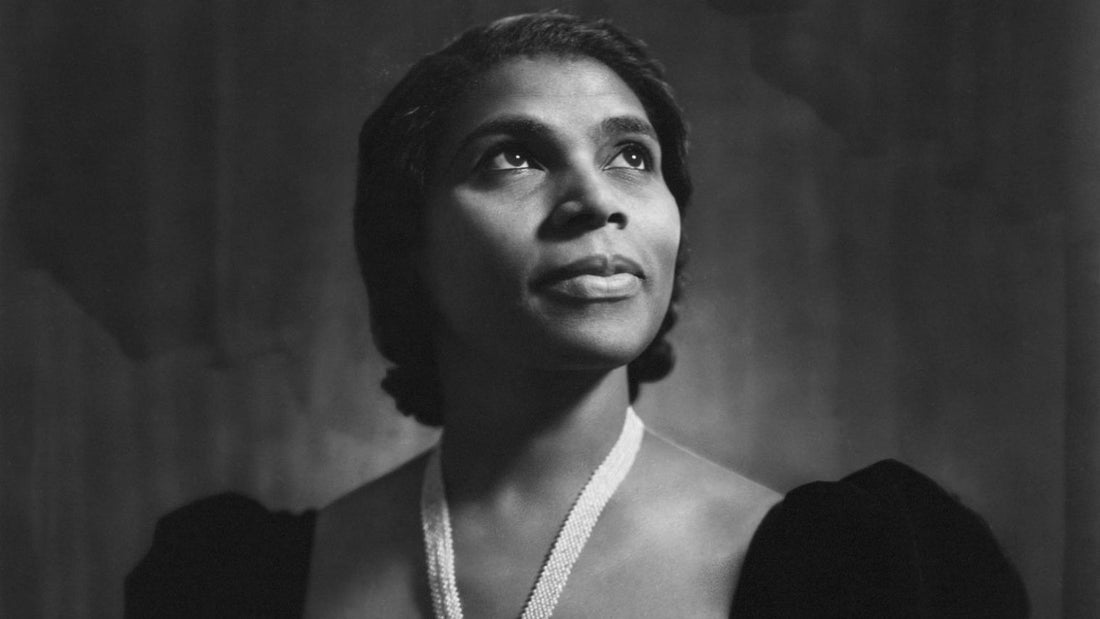


Meet the Captivating Contralto: Marian Anderson
Marian was born the city of brotherly love, Philly, in 1897. She grew up in a devout Christian family that was very active in the church which gave Marian the opportunity to perform at church musicals starting at the age of 6. She often performed duets with her Aunt who took her to perform at other churches and YMCA benefit concerts. Her Aunty Mary acted as her first manager - securing local paying gigs for Marian. By the time she was in her teens, she was getting $5 for each performance which was pretty considerable in the early 1900s.
Marian suffered a few losses growing up when she lost her father to a tragic work accident. Shortly after that, she was rejected from Philadelphia Musical Academy because she was Black but that seemed to give her more motivation to pursue her dream. In 1925, she won a singing competition sponsored by the New York Philharmonic which gave her the opportunity to perform with the orchestra during one of their shows. The audience immediately loved it and the praise sparked her beginnings in opera. However, racial prejudice slowed her career growth until she performed at Orchestra Hall in Chicago. Her performance was amazing and led to a scholarship to study in Berlin and it was in Europe where she was free to show off her skills.
Only after a few short months, she launched a highly successful European singing tour. Along the way, she met Kosti Vehanen who became her pianist and vocal coach. In Europe, Anderson flourished and partnered with Jean Sibelious who composed songs just for her. She debuted at Wigmore Hall in London and spent the next 5 years sweeping audiences away with “Marian Fever”. Her success was largely due to the fact she was not met with the same racism and discrimination in the United States and became a favourite for audiences, composers and major European orchestras.
Marian returned to the US under the new management of Sol Hurok. Now with the success of Europe under her belt, she took over the US, performing at notable venues including The Town Hall in NY. But racism still prevented her from being accepted at hotels and restaurants. So much so, that Albert Einstein hosted Anderson when she was refused a room while performing at Princeton University. The more she was denied, the more the support grew. The turning point was when the Daughters of the American Revolution denied permission for her to sing at the DAR Constitution Hall. This single act was a rallying cry for NAACP, National Negro Congress and the Brotherhood of Sleepping Car porters who united to support and protest against the singer’s denial.
As the movement spread, mainstream media supported Anderson's right to sing which led to the First Lady Eleanor Roosevelt resigning from the DAR. The support for Marian grew so large, that President Roosevelt and some of his constituents arranged for an open air concert on Easter Sunday where a crowd of 75,000 people gathered to hear Marian sing. Two months later, Marian was awarded the 1938 Springarn Medal for Distinguished Achievement presented by Eleanor Roosevelt. Furthermore, on January 7, 1955, Anderson became the first African-American to sing with the Metropolitan Opera in New York. With that, Anderson became a fan favorite despite the early rejections.
She sang for inaugurations for Eisenhower and John F Kennedy along many other benefit concerts. She became a champion of civil rights in the 60s as well, partners with organization like the NAACP. In 1963, she sang at the March on Washington for Jobs and Freedom. That same year, she received one of the newly reinstituted Presidential Medal of Freedom, which is awarded for "especially meritorious contributions to the security or national interest of the United States, World Peace or cultural or other significant public or private endeavors. Marian is a legend, and an American contralto broke down barriers and blazed her own trail. Thank you Marian for never given up on your dream.
Happy Black History Month!



